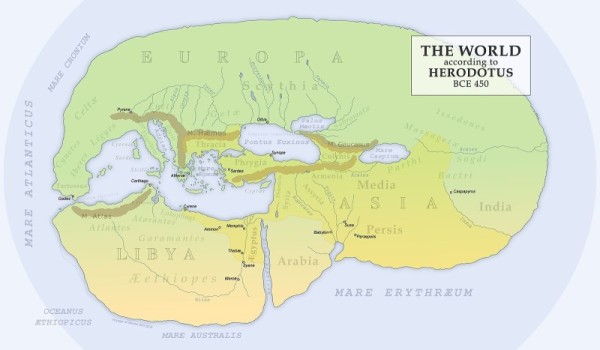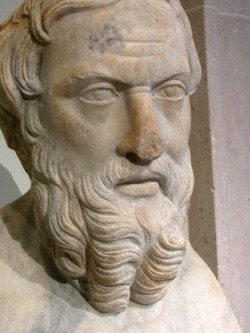So when the Persians arrived at Samos bringing Syloson home from exile, no one raised a hand against them, and moreover the party of Maiandrios and Maiandrios himself said that they were ready to retire out of the island under a truce.

Translated by George C. Macaulay — our special project presenting the complete Herodotus with URLs for all of those people, places, events, and things which baffles and discourages modern readers.
Previously on Herodotus
141. Darius having heard this prepared to send an expedition with Otanes as commander of it, who had been one of the seven, charging him to accomplish for Syloson all that which he had requested. Otanes then went down to the sea-coast and was preparing the expedition.
142. Now Maiandrios the son of Maiandrios was holding the rule over Samos, having received the government as a trust from Polycrates; and he, though desiring to show himself the most righteous of men, did not succeed in so doing: for when the death of Polycrates was reported to him, he did as follows:—first he founded an altar to Zeus the Liberator and marked out a sacred enclosure round it, namely that which exists still in the suburb of the city: then after he had done this he gathered together an assembly of all the citizens and spoke these words:
“To me, as ye know as well as I, has been entrusted the sceptre of Polycrates and all his power; and now it is open to me to be your ruler; but that for the doing of which I find fault with my neighbor, I will myself refrain from doing, so far as I may: for as I did not approve of Polycrates acting as master of men who were not inferior to himself, so neither do I approve of any other who does such things. Now Polycrates for his part fulfilled his own appointed destiny, and I now give the power into the hands of the people, and proclaim to you equality. These privileges however I think it right to have assigned to me, namely that from the wealth of Polycrates six talents should be taken out and given to me as a special gift; and in addition to this I choose for myself and for my descendants in succession the priesthood of Zeus the Liberator, to whom I myself founded a temple, while I bestow liberty upon you.”
He, as I say, made these offers to the Samians; but one of them rose up and said: “Nay, but unworthy too art thou to be our ruler, seeing that thou art of mean birth and a pestilent fellow besides. Rather take care that thou give an account of the money which thou had to deal with.”

CC BY-SA 2.0 image from Wikipedia.
143. Thus said one who was a man of repute among the citizens, whose name was Telesarchos; and Maiandrios perceiving that if he resigned the power, some other would be set up as despot instead of himself, did not keep the purpose at all of resigning it; but having retired to the fortress he sent for each man separately, pretending that he was going to give an account of the money, and so seized them and put them in bonds. These then had been put in bonds; but Maiandrios after this was overtaken by sickness, and his brother, whose name was Lycaretos, expecting that he would die, put all the prisoners to death, in order that he might himself more easily get possession of the power over Samos: and all this happened because, as it appears, they did not choose to be free.
144. So when the Persians arrived at Samos bringing Syloson home from exile, no one raised a hand against them, and moreover the party of Maiandrios and Maiandrios himself said that they were ready to retire out of the island under a truce. Otanes therefore having agreed on these terms and having made a treaty, the most honorable of the Persians had seats placed for them in front of the fortress and were sitting there.
145. Now the despot Maiandrios had a brother who was somewhat mad, and his name was Charilaos. This man for some offence which he had been committed had been confined in an underground dungeon, and at this time of which I speak, having heard what was being done and having put his head through out of the dungeon, when he saw the Persians peacefully sitting there he began to cry out and said that he desired to come to speech with Maiandrios. So Maiandrios hearing his voice bade them loose him and bring him into his presence; and as soon as he was brought he began to abuse and revile him, trying to persuade him to attack the Persians, and saying thus:
“Thou basest of men, didst thou put me in bonds and judge me worthy of the dungeon under ground, who am thine own brother and did no wrong worthy of bonds, and when thou seest the Persians casting thee forth from the land and making thee homeless, dost thou not dare to take any revenge, though they are so exceedingly easy to be overcome? Nay, but if in truth thou art afraid of them, give me thy mercenaries and I will take vengeance on them for their coming here; and thyself I am willing to let go out of the island.”
146. Thus spoke Charilaos, and Maiandrios accepted that which he said, not, as I think, because he had reached such a height of folly as to suppose that his own power would overcome that of the king, but rather because he grudged Syloson that he should receive from him the State without trouble, and with no injury inflicted upon it. Therefore he desired to provoke the Persians to anger and make the Samian power as feeble as possible before he gave it up to him, being well assured that the Persians, when they had suffered evil, would be likely to be as bitter against the Samians as well as against those who did the wrong, and knowing also that he had a safe way of escape from the island whenever he desired: for he had had a secret passage made under ground, leading from the fortress to the sea. Maiandrios then himself sailed out from Samos; but Charilaos armed all the mercenaries, and opening wide the gates sent them out upon the Persians, who were not expecting any such thing, but supposed that all had been arranged: and the mercenaries falling upon them began to slay those of the Persians who had seats carried for them and were of most account. While these were thus engaged, the rest of the Persian force came to the rescue, and the mercenaries were hard pressed and forced to retire to the fortress.
– Herodotus, Book III
| <—Previous | Master List | Next—> |
Herodotus made his living by being interesting. In a world where most people did not read and could not afford to buy a book even if they could, they would pay to listen to Herodotus recite from his books. They would not pay to be bored. In that world, the names that populate his stories would have some general familiarity to his audience. Their obscurity to us is a barrier that this series seeks to break down.
MORE INFORMATION
MAP LIBRARY
Because of lack of detail in maps as embedded images, we are providing links instead, enabling readers to view them full screen.

Leave a Reply
You must be logged in to post a comment.